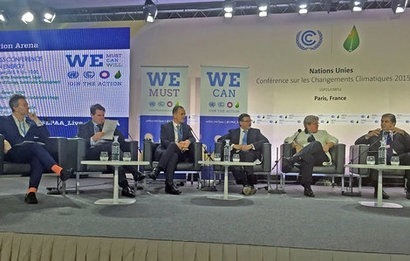
New analysis from the International Renewable Energy Agency (IRENA) finds that achieving a 36 per cent share of renewable energy by 2030 would result in half of all emission reductions needed to maintain a two-degree pathway, while energy efficiency measures could supply the rest.
“With the energy sector accounting for some two-thirds of global greenhouse gas emissions, the decarbonisation of energy must be at the heart of any effort to keep global temperature rise below two degrees Celsius” said IRENA Director-General Adnan Z. Amin. “The energy transition is underway worldwide but more action is needed. To scale up efforts to the level needed, we must utilise all available technologies, increase ambition among all actors in all regions of the world, and mobilise the funds needed to enable the transition.”
Hundreds of governments, businesses and cities are making strong commitments to accelerate the ongoing energy transition at the UN Climate Change Conference (COP21) in Paris. The organisations are joining forces to establish a set of major cooperative initiatives being presented today during the Lima-Paris Action Agenda (LPAA) Focus on Energy. The announcements will include new initiatives emerging to help drive the transition further forward.
The conference will also see the official launch of the Global Geothermal Alliance which is aiming to achieve a 500 percent increase in global installed capacity for geothermal power generation and a 200 percent increase in global installed capacity for geothermal heating by 2030. At present, the world contains vast geothermal energy potential across nearly 90 countries although almost 90 percent of this remains untapped.
The new alliance is a partnership of 36 countries and 23 institutions with an action plan in place to guide its success.
Another organisation, the Africa Clean Energy Corridor aims to boost renewable power deployment, reduce carbon emissions and support sustainable, climate-friendly economic growth. By facilitating a larger electricity market, the initiative could attract sufficient investments to meet half of all power needs in eastern and southern Africa by 2030. At COP21, IRENA and partners will announce efforts to develop a clean energy corridor in western Africa as well.
The Small Island Developing States (SIDS) Lighthouses Initiative will announce that Saint Lucia is the 29th island to join the initiative. Since its launch in September 2014, 18 SIDS have developed roadmaps for deployment of renewable energy, $150 million has been mobilised for renewable energy projects on SIDS, and 18 MW of renewable energy has been deployed. The initiative will also announce a new pilot project development facility to help develop more bankable projects.
In order to meet climate objectives, renewable energy uptake across the world would need to increase six-fold from current levels, requiring annual global investment to nearly double, exceeding $500 billion in the period up to 2020, and more than triple to exceed $900 billion from 2021 to 2030.
Image: From left to right: Nick Nuttall (Moderator), UNFCC; Jean-Marc Ollagnier, CEO, Accenture Resources; Steve Howard, CSO, IKEA; Adnan Z. Amin, Director-General, IRENA; Rachel Kyte, incoming CEO, SE4All; Khaled Fahmy, Minister of Environment, Egypt, Chair of AMCEN
For additional information:
International Renewable Energy Agency (IRENA)

